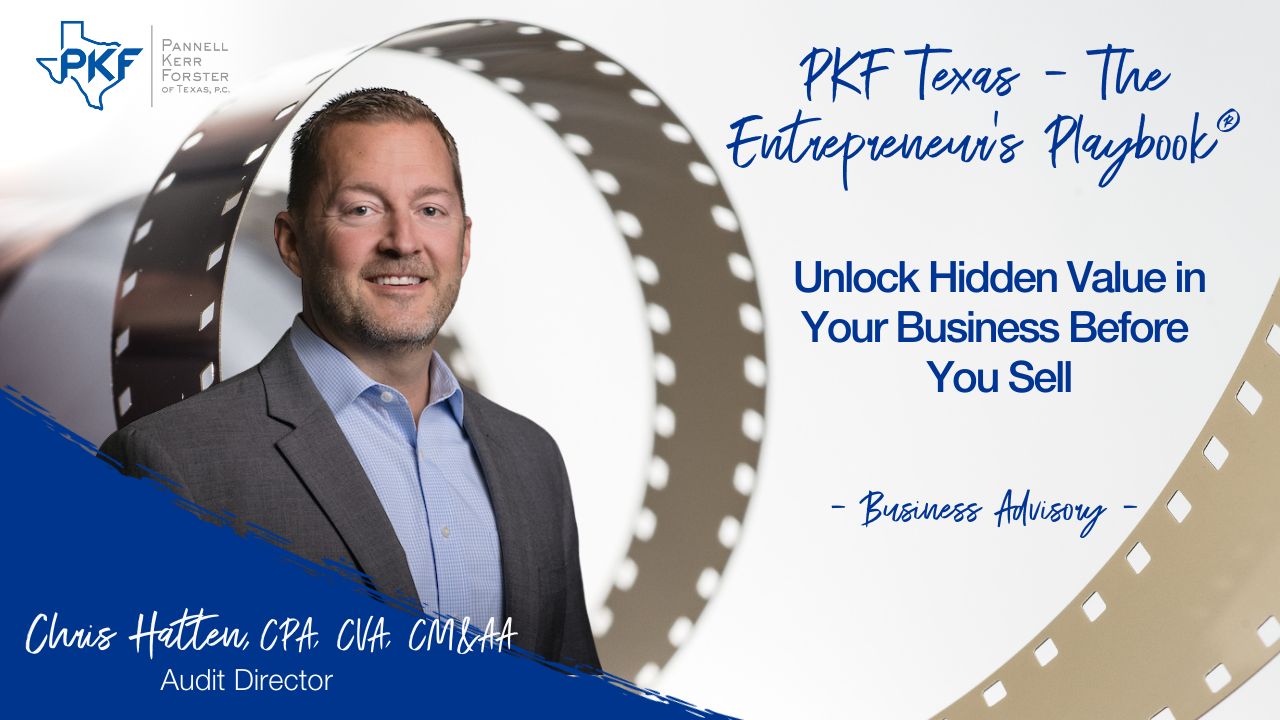Key Players in Your Business Transaction: Don’t Sign Without Them

When selling or buying a business, having the right advisors is crucial. Chris Hatten, CPA, CM&AA, CVA, Director in Transaction Advisory Services at PKF Texas, outlines the three professionals you need to help your deal goes off without a hitch. Learn why an investment banker, a CPA, and an M&A attorney are needed and how they can protect you from costly mistakes.
Jen: This is the PKF Texas Entrepreneur’s Playbook, I’m Jen Lemanski, and I’m back once again with Chris Hatten, one of our Approachable Advisors® and a director in our transaction advisory services group. Chris, welcome back to the Playbook.
Chris: Appreciate it, Jen.
Jen: So oftentimes we’re talking about things that impact both the buyer and the seller in a transaction, and if somebody’s looking for either to sell their business or buy their business, who else needs to be involved in that transaction?
Chris: Well, we’re going to focus on three people here. The first one being an investment banker or a business broker. And the differentiator there is usually the size of the transaction. So, your investment banker is going to be on the upper end of that scale and your business brokers and be on some of the smaller transactions. And the benefit that they have is that they’re going to be able to help you through the different various exit options. And so, some of that might be selling to a strategic buyer or private equity. And so, that’s where they kind of come into play. And then they’re also going to help you with identifying that different pool of investors and as well as, one, making sure that you’re ready for the sale because neither party, whether it’s the seller and the investment bank wants to invest a whole lot of time, and then, like we’ve talked about, get to, we’ll say the altar and they get cold feet and then have to back out of the transaction. And they’re also going to be great about making sure that they identify what we’d say would be a good fit for you. And so, sometimes it’s not all about chasing that dollar.
Jen: There needs to be some cultural fit there too.
Chris: Yeah. Yes. Sometimes, but also sometimes the, let’s say the seller is going to want to exit the business altogether, which could potentially be problematic if they haven’t been doing a good job of getting their business ready to live without them. Or sometimes they want to be part of what we call that second bite of the apple. And so, they roll their equity into the new transaction. And so, depending on where they are in the spectrum of how much involvement they want to be involved with in the transaction afterwards the investment bank is going to make sure that there’s a good fit for that going forward. Then I think the second one is, not to toot our own horn, but would be a CPA.
Jen: Yes. We like to be involved in those things.
Chris: Right. And more so probably from the tax side, I would say. Obviously when you see that initial offer, let’s say it’s $10 million and you’re like, oh, this is going to be great. Well, we all know that the government and the state.
Jen: They, they want their share.
Chris: They want their share, and it’s usually a lot bigger share than what you want it to be. And so, they’re going to be able to help go through that gross proceeds figure, identify what’s going to the government, what’s going to the state, if anything, as well as any other potential parties. And they’re also going to be able to help you work with, you might have a wealth advisor at that point or need to have one engaged because this number could be large enough. And so, they’re going to build work with your wealth advisor because there might be some tax planning strategies that go into it beforehand. And so, it might involve some gifting of money to children or other family members prior to transaction or immediately afterwards. And so, they’re going to have to partner with that other advisor as well. There are other aspects that go into it. And one of them would be is some of the stuff is going to potentially be a tax debt, capital gains versus ordinary income. And so, there’s just all these different nuances that go into it. And so, they’re going to help you. Everybody wants to pay what they owe, but not a penny more. And so, your tax advisor’s going to help on that front.
And then I would say the third one is going to be a M&A attorney. Unless your corporate attorney is doing multiple of these a month, you probably don’t want to go with him. You want to go with somebody who’s specialized. I say that this is somewhat akin to going from your primary care physician to a specialist because they might be able to help out with initial blocking and tackling on a transaction. But then, similar to your doctor, if you have something more complicated, you don’t want to be their Guinea pig as they’re kind of trying to step up their skillset.
Jen: You want somebody living and breathing it every day.
Chris: Yeah. They also know all the different levers that need to be, get pulled in a transaction to make sure that they’re maximizing that value for you. And so, sometimes that initial number that gets offered isn’t exactly where you need it to be. And so, they might sit there and work out some different earn out type of agreement so that if you’re confident in the numbers you’re going to be able to sit there and say, well if we continue on this trajectory, do we have some different milestones where we can sit there and get a little kicker, extra juice, as far as the transaction and that kind of stuff goes.
Jen: Yeah. Like, let’s structure the deal this way to help out your ultimate goal.
Chris: Yeah. And they’re going to make sure that you’re not retaining any liabilities that you shouldn’t. They’re going to go through that document with a fine-tooth comb make sure that everything that you have agreed upon in principle is then.
Jen: Executed
Chris: In writing that kind of stuff so that it’s going to hold up should there ever be a disagreement with the seller afterwards, which unfortunately does happen pretty frequently. So, those are the main three that I would say that have to be involved as part of a transaction. There might be some ancillary folks, like I said, the wealth advisor or some valuation folks, they might get pulled in along the way, but these are the three people that I would say are kind of like your air traffic controller. They’re going to kind of help guide the process and hopefully get you to that safe landing.
Jen: You’ll want them involved fairly early on in the process.
Chris: Yeah. You don’t want to be signing any paperwork until you’ve actually got these people engaged because once you start signing documents, you start losing leverage in the transaction. And that initial offer that the investment banker or strategic buyer makes, it never goes up. They just try and whittle it down from, they start nitpicking along the way and that kind of stuff. So, that number only goes down. So, these three folks are what going to help you get the deal across the finish line, but also then allow you to continue to operate the business because it becomes personal as you start getting nitpicked over as part of the transaction, you can get a little, your temper might flare a little bit, that kind of stuff. And so, you’ve got these three people running point for you to kind of shield you from that process.
Jen: Perfect. Well, sounds like we’ve got some more to talk about, and we’ll get you back to talk about some more transaction related topics. Sound good?
Chris: We can do that.
Jen: This has been another Thought Leader production, brought to you by PKF – Texas the Entrepreneur’s Playbook. For more information about this and other topics, visit pkftexas.com/insights. Tune in next week for another chapter.

